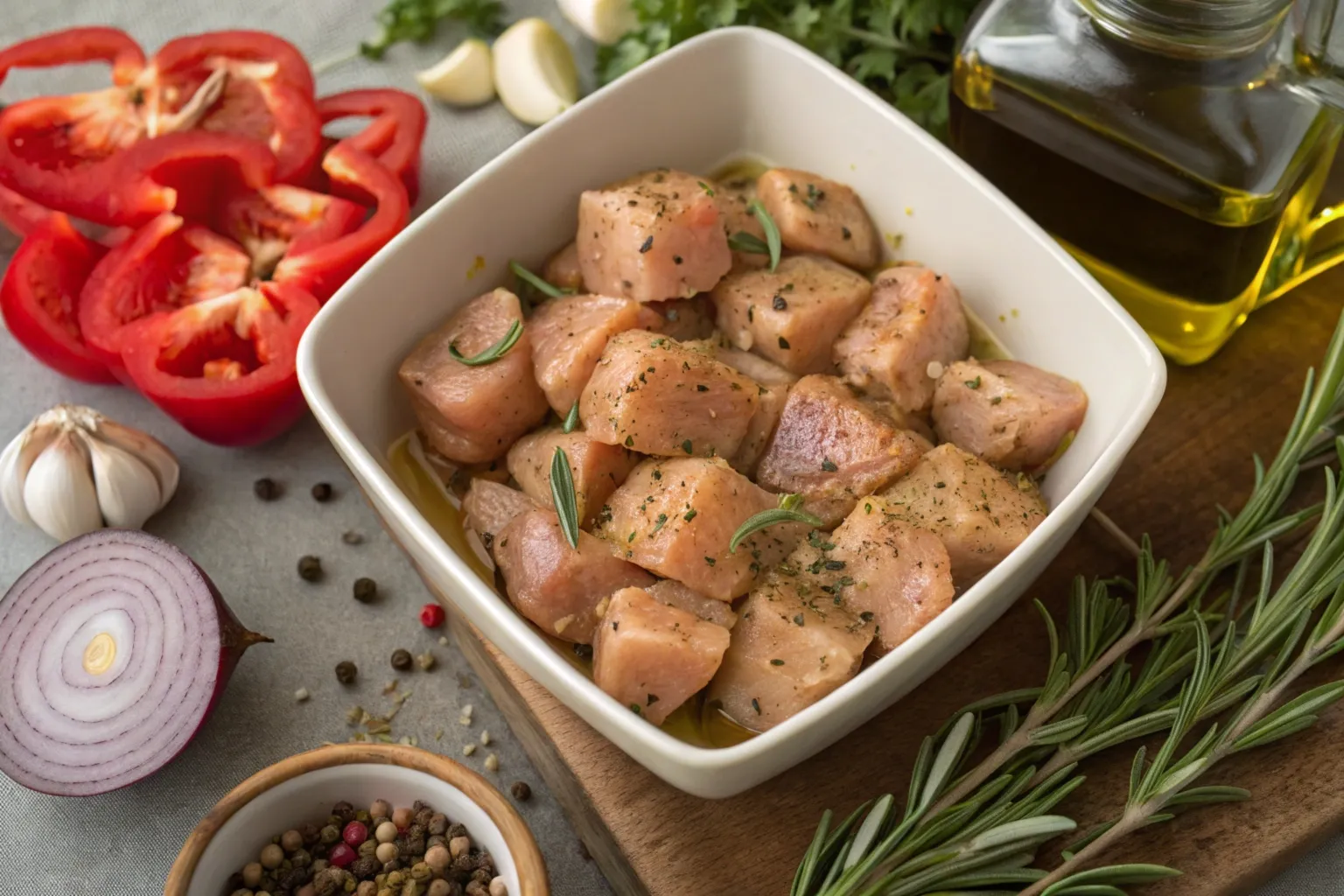Discover how long to marinate cubed chicken? and learn best practices, timing, and flavor tips for juicy, tender results.
Marinating cubed chicken can elevate an ordinary meal into something memorable. However, timing plays a crucial role. Indeed, learning how long to marinate cubed chicken? ensures you achieve tenderness and depth of flavor every time. Basically, a well-planned marinade and the right marinating duration prevent bland, dry chicken. Eventually, you’ll impress your family and friends with perfectly seasoned, juicy chicken cubes.
Understanding the Basics of Marinating How Long to Marinate Cubed Chicken?
Marinating involves soaking chicken in a blend of acid, fat, and seasonings. Generally, acids like citrus juice or vinegar break down some proteins, creating a tender texture. Equally, oil helps distribute flavors and lock in moisture. Herbs, spices, and aromatics add complexity and character.
However, always handle raw chicken safely. Keep it refrigerated while marinating to reduce bacterial risk. Wash hands and utensils thoroughly before and after touching raw meat. Undoubtedly, focusing on safety and proper handling ensures a positive cooking experience. Eventually, understanding these fundamentals helps you decide how long to marinate cubed chicken? confidently.
Choosing the Right Marinating Time How Long to Marinate Cubed Chicken?
Determining the best marinating time depends on several factors. Firstly, smaller cubes absorb flavors faster than larger pieces, so they may need less time. Secondly, consider the strength of the marinade. Highly acidic blends act quickly but can lead to mushiness if left too long.
Additionally, refrigeration slows flavor infusion, so you might need a bit more time when storing chicken in the fridge. Conversely, marinating at room temperature speeds absorption but risks safety. Therefore, always marinate in the fridge.
In general, 30 minutes to 2 hours suits many mild marinades. Stronger marinades might need less time, while richer, oil-based blends can go longer without harming texture. Eventually, experience and personal taste guide your final decisions.
Looking for breakfast ideas? Check out Is it Good to Eat Chicken for Breakfast? Benefits & Recipes.
Recommended Time Guidelines for Different Marinades How Long to Marinate Cubed Chicken?
Citrus-based marinades with lemon or lime juice typically work well between 30 minutes and 1 hour. Longer than that, and the chicken may become too soft.
For yogurt or buttermilk marinades, aim for about 2 to 4 hours. These dairy-based blends tenderize gently, allowing the chicken to remain juicy without turning mushy.
Soy-based marinades offer savory depth. Generally, 2 to 6 hours is appropriate. However, consider salt content, as prolonged marination can intensify saltiness.
Herb and oil-based marinades are flexible. Marinate for 1 to 4 hours for balanced flavor. If pressed for time, even 30 minutes can make a difference.
Quick marinades rely on bold flavors and chopped aromatics. They can improve taste in as little as 15-30 minutes, making them perfect for busy weeknights.
For more high-protein breakfast options, visit Chicken Breakfast Recipes: Delicious & High-Protein.
Techniques to Maximize Flavor and Tenderness

Beyond timing, additional techniques enhance marinated chicken. For example, using a vacuum sealer removes air pockets, improving flavor penetration. Additionally, massaging the marinade into the chicken or flipping the pieces periodically ensures even coverage.
Injecting marinade into the meat can speed up flavor absorption. However, use this method sparingly to avoid over-seasoning. Basically, combining these approaches with the ideal marinating time guarantees consistent, delicious results. If you’re wondering how chicken pairs with other proteins, explore Do Eggs and Chicken Go Together?.
Storage and Food Safety Tips
Always marinate cubed chicken in the refrigerator. Undoubtedly, this practice prevents bacteria from multiplying. Store the chicken in a sealed container or a zip-top bag. Thus, odors stay contained, and cross-contamination is minimized.
If you plan to marinate overnight, ensure the marinade isn’t overly acidic. Too much acid over many hours can alter texture negatively. Additionally, never reuse marinade as a sauce without boiling it first to kill any bacteria. Basically, follow these guidelines to keep your meal safe and flavorful.
Common Mistakes and How to Avoid Them
One common error is using too much acid for too long. Consequently, the chicken turns mushy. Therefore, balance acid levels and shorten marinating times if necessary.
Another mistake involves not adjusting marinade volume. Too little marinade leads to uneven flavor, while too much wastes ingredients and dilutes intensity. Likewise, marinating for excessive lengths of time does not always improve the outcome. Instead, learn how long to marinate cubed chicken? by experimenting with various durations.
Creative Marinade Ideas for Different Cuisines
Global flavors inspire endless combinations. For a Mediterranean twist, combine olive oil, lemon zest, garlic, and fresh herbs. Marinate 1-2 hours for bright flavors.
Asian-inspired blends might include soy sauce, ginger, garlic, and sesame oil. Around 2-4 hours creates savory depth. Latin flavors rely on lime juice, cilantro, cumin, and chili powder. Aim for 1-2 hours, but watch acidity levels.
Middle Eastern marinades often involve yogurt, turmeric, paprika, and coriander. A 2-4 hour soak yields tender, aromatic results. American BBQ fans might prefer brown sugar, smoked paprika, and a hint of mustard. Two hours often brings out the best flavors.
Curious about globally renowned chicken dishes? Discover Which Is the Tastiest Chicken Dish in the World?.
Cooking Methods After Marinating
After marinating, consider how you’ll cook the chicken. Grilling adds smoky complexity but requires removing excess marinade to avoid flare-ups. Baking provides even heating, preserving moisture.
Stir-frying locks in juices with high heat and short cooking times. Sautéing offers similar advantages. Skewering chicken with veggies creates colorful kabobs. Always ensure the internal temperature reaches 165°F before serving.
Combining proper marinating time and the right cooking technique produces succulent, flavorful chicken every time.
Refining Your Marinade Approach Through Experimentation

Before addressing common questions, think about refining your personal marinade strategy. Instead of strictly following recipes, experiment with ratios and times. For instance, start with a basic marinade and marinate cubed chicken for an hour. After cooking, taste it and assess the flavor intensity and texture.
If the chicken seems bland, try increasing the marinating time by 30 minutes next time. Alternatively, add more aromatics or slightly more acid. Conversely, if the chicken tastes overly tangy or appears mushy, shorten the marinating time or reduce acidic ingredients.
Keep a small notebook or digital log of your marinade attempts. Note the ingredients, marinating duration, and final impressions. Over time, patterns emerge. For example, you might discover that soy-based marinades need less time than you initially thought. Or maybe your dairy-based marinade benefits from a slightly longer soak during cooler months.
Also consider the cooking method. If grilling at high heat, a shorter, more intense marinade may suffice since the char adds additional flavor complexity. For baking at moderate heat, a longer, milder marinade can lend subtle depth without overpowering the dish.
Think seasonally too. In summer, fresh herbs and citrus might shine with just one hour of marinating because produce is at its peak. In winter, richer marinades featuring warming spices might need 2-3 hours to develop robust comfort-food flavors.
Pair the marinade with side dishes that complement or balance the flavors. If serving the chicken with a bright, tangy salad, you might not want an overly intense marinade. Conversely, if the chicken stands as the centerpiece, deepen the flavor with a slightly longer soak.
Additionally, taste-testing along the way can help. Take a small sample of the marinated chicken and quickly cook it before committing to the entire batch. If it needs more intensity, return the remaining chicken to the marinade. If it’s already perfect, proceed with cooking.
This flexible, iterative process helps you perfect how long to marinate cubed chicken? for your personal taste, kitchen conditions, and desired flavors. Eventually, these insights enable you to marinate with confidence and creativity, turning every meal into a culinary success.
Frequently Asked Questions
How long can you marinate cubed chicken? How Long to Marinate Cubed Chicken?
You can typically marinate cubed chicken from 30 minutes up to 4 hours. Shorter times, like 30-60 minutes, suit acidic marinades or busy schedules. Meanwhile, 2-4 hours works well for milder blends. Adjust timing to taste and watch for texture changes. Eventually, find a duration that enhances flavor without causing mushiness.
Is 2 hours enough to marinate chicken? How Long to Marinate Cubed Chicken?
Yes, 2 hours often suffices for most marinades. Indeed, 2 hours gives flavors time to penetrate the outer layers of the cubed chicken. Stronger marinades may need less time, while milder ones could go slightly longer. However, 2 hours stands as a versatile baseline, helping you achieve balanced flavor and texture.
How long can I marinate chicken in the fridge? How Long to Marinate Cubed Chicken?
You can safely marinate chicken in the fridge for up to 24 hours if using a mild marinade. For cubed chicken, shorter periods like 2-4 hours often yield better texture. Overly acidic or salty marinades should not exceed a few hours to avoid an unpleasant consistency. Always keep the chicken refrigerated for safety.
How do you tenderize cubed chicken?
Tenderizing cubed chicken involves using mild acids, dairy-based marinades, or enzymatic ingredients like pineapple or papaya juice. Additionally, cutting the chicken into uniform cubes and not overcooking it helps maintain tenderness. Marinate wisely, choose appropriate acid levels, and cook to 165°F for moist, tender chicken.
Conclusion
Ultimately, mastering how long to marinate cubed chicken? allows you to deliver succulent, flavorful meals. By understanding the role of different marinade ingredients, balancing marinating times, and practicing safe handling, you become a more confident and creative cook. Experimentation, note-taking, and adjusting based on personal taste help you refine your technique.
Eventually, you’ll know exactly when to pull the chicken from the marinade, no matter which flavors you choose. Embrace this culinary skill and enjoy the versatility and richness that marinated chicken brings to your dinner table. Undoubtedly, the effort pays off in every delicious, juicy bite.
Additional Notes:
Choosing the Right Marinade for Maximum Flavor
When striving for maximum flavor, start by choosing a marinade that strikes a harmonious balance between oil, acid, and seasonings. The oil helps distribute flavors evenly and retain moisture, while the acid—such as lemon juice, lime juice, or vinegar—tenderizes the chicken by gently breaking down some of the proteins. Seasonings like herbs, spices, and aromatics then come into play, adding depth and complexity to each bite.
It’s helpful to consider the culinary tradition you’re aiming for. For instance, a Mediterranean marinade might lean on olive oil, garlic, and fresh herbs, while Asian-inspired blends often rely on soy sauce, ginger, and sesame oil. Matching marinade flavors to the cuisine not only enhances the chicken’s taste but also creates a cohesive dining experience.
Safe Marinating Practices
Once the marinade is ready, always keep the marinating chicken in the refrigerator. This simple step protects against harmful bacteria growth, which thrives at room temperature. Refrigeration ensures that the chicken remains safe to eat and preserves the marinade’s freshness.
But while marinating can boost flavor, it’s possible to have too much of a good thing. Overly acidic marinades left on for too long can result in mushy or stringy chicken. Sticking to the recommended marinating times ensures that the acidity gently tenderizes without compromising the meat’s texture.
Tips for Better Flavor Absorption
For even better flavor absorption, take a moment to gently massage the marinade into the cubed chicken. This step helps ensure that every piece is well-coated, promoting uniform taste and tenderness.
Additionally, consider using a resealable Ziploc bag or a covered dish for marinating. A bag allows you to press out excess air and encourage even coverage, while a covered bowl keeps the marinade sealed and prevents contamination. Both options create an environment in which the chicken and marinade can mingle effectively.
Experiment and Refine Your Technique
Ultimately, these simple tips—selecting the right marinade, marinating in the fridge, avoiding excessive marinating times, massaging the marinade into the meat, and using proper storage methods—contribute to achieving a moist, flavorful chicken dish that delights the palate.
Over time, experimenting with different marinades and techniques will further refine your approach, making every meal more enjoyable and memorable.

